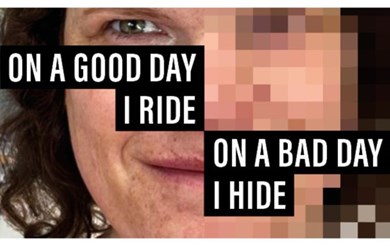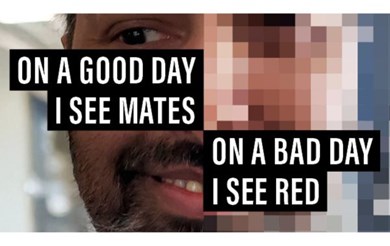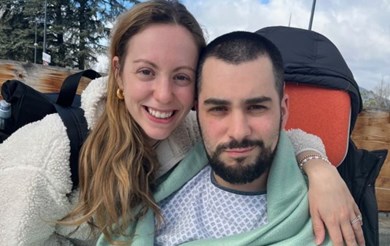Brain injury survey results
Our Action for Brain Injury Week 2025 campaign, On a good day, has explored the fluctuating nature of brain injury and aims to improve society’s understanding of how it can best support both survivors and carers with this.
As part of the campaign, we launched a set of surveys to explore the fluctuating nature of brain injury.
The surveys contained both quantitative and qualitative questions to gather experiences from people with lived experience of brain injury on how their day-to-day lives fluctuate due to brain injury.
The surveys were completed by a total of 1,203 people affected by brain injury. Of these, 957 were brain injury survivors and 246 were family, partners, friends and carers of survivors.
Here are some key findings and a selection of quotes from survey respondents.
The most fluctuating effects of brain injury
Fatigue, memory, anxiety and concentration are reported to be the most commonly fluctuating effects of brain injury.
64% of survivors and 53% of carers lose their tempers more easily on a survivor’s bad day
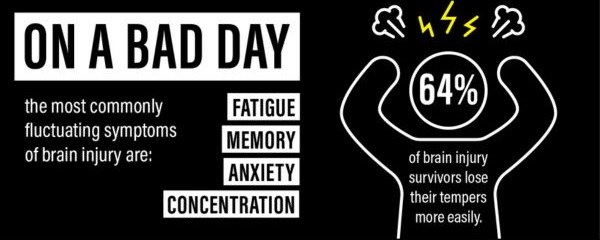
What we heard
On a good day
“I think things go better when my head feels clearer without the constant buzzing.”
On a bad day
“All of my bad stuff comes from my fatigue, usually I am okay in the mornings and have bad days in the afternoons. Emotional and cognitive situations, and general noise and overwhelm, leave me exhausted, and then I have 'bad day' symptoms.”
Need support?
Find out more about these effects and others on our Effects of brain injury page.
A good day vs a bad day
80% of survivors and 84% of carers feel low in mood on a survivor’s bad day. Conversely, 80% of survivors and 91% of carers feel good on a survivor’s good day.
80% of survivors and 91% of carers feel good on a survivor’s good day
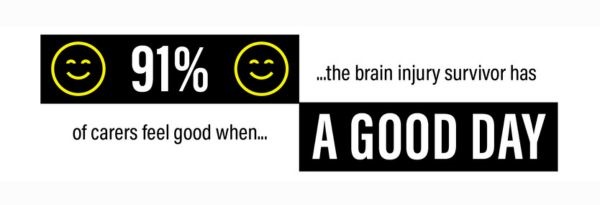
What we heard
On a good day
“Happy, bouncy, excited, can see things sharply. Take pleasure in small things. Enjoy my hobbies (gym, running, seeing friends). Feel happy like I don’t want the day to end. Grateful to be here.”
On a bad day
“I feel everything, and seem unable to control it - anger, irritation, anxiety, which can then interact with the headaches. I think it makes me a very unpleasant person to be around, so on those days, I tend to "hide" in my office. For my sake and everyone else's!”
Work and study after brain injury
86% of survivors and 78% of carers find working or studying difficult on a survivor’s bad day. Conversely, 62% of survivors and 78% of carers find work or studying easier on a survivor’s good day.
86% of survivors and 78% of carers find working or studying difficult on a survivor’s bad day
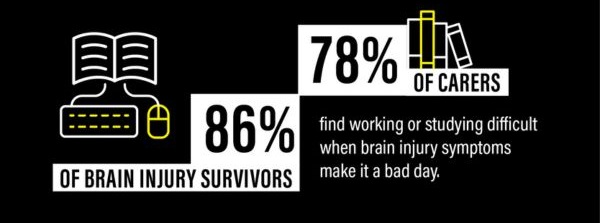
What we heard
On a good day
“I have confidence in my career skills - writing and communicating. I can make people laugh. I want to get lots done to make the most of what I know will be a limited window of opportunity.”
On a bad day
"Pulled in multiple directions. I feel like I am unable to juggle all the demands when he needs more support, I feel guilty that I'm not able to do anything fully, I can't give him everything he needs, I can't commit completely to work, I can't look after our animals as well as I should, I can't give attention to friends and family - you just feel you're failing whatever you do.”
Need support?
If you are struggling to concentrate on work or study, these publications could help:
Relationships after brain injury
Around three-quarters of survivors felt their relationships with a partner and others are negatively affected on a bad day. Conversely, two-thirds felt that
their relationship with a partner is good on a good day, although even on a good day, 27% still felt the relationship was neither good nor bad.
Half of carers felt that their relationship with the survivor and others are negatively affected on a survivor’s bad day. Conversely, 85% felt that their relationship was good on a survivor’s good day.
Around three-quarters of survivors felt their relationships with a partner and others are negatively affected on a bad day
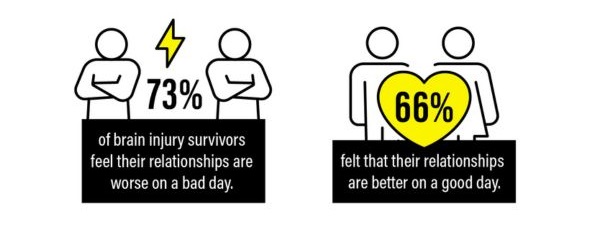
What we heard
On a good day
“The love and support I get from my family and friends always make it a good day.”
On a bad day
"I feel detached from the world and emotionless. I am not able to socialise even with my husband. So it's very isolating. Everything is a struggle even thinking.”
Independence after brain injury
Around three-quarters of survivors find it difficult to do things independently on a bad day. However, even on a good day, around a tenth of survivors struggle to do things independently.
Two-thirds of carers find it difficult to do things independently when the survivor has a bad day. Conversely, just over three-quarters can do things independently when the survivor has a good day.
Even on a good day, around a tenth of survivors struggle to do things independently
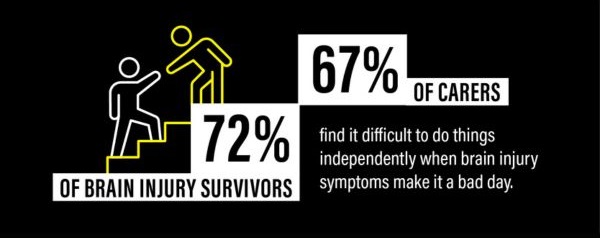
What we heard
On a good day
“If I've achieved something on my own that I would probably avoid, like using a bank card or gardening. If I've actually remembered a day and date or what is happening on that day makes me a little bit more 'worthwhile'.”
On a bad day
"Inability to do what I used to do. Lack of independence and confidence.”
The boom-bust cycle
For many survivors, a good day is not necessarily ‘good’ but simply not as bad as a bad day. Effects of brain injury can still be problematic on good days, with some survivors and carers worrying even on good days that things can change at any moment for them. Furthermore, some survivors reported that good days were often directly followed by bad days, due to the ‘boom-bust’ cycle of attempting to do too much on good days and consequently struggling the next day, causing a bad day.
What we heard
“My bad days usually follow what should have been a good day, when I’ve done too much and so fatigue wipes me out causing me to have a bad day when I can hardly do anything and might just have to stay in bed.”
Routine and control
Many survivors emphasised how routine and things going according to plan contributed to a good day. Just as following routines helped to make a good day for many survivors, unexpected changes in plans or a shift in routine were a cause of anxiety for many that contributed to a bad day.
What we heard
On a good day
“Feel organised and in control. Got things planned. Things have gone to plan and no issues problems to try to deal with and problem solve. Not had to cancel things or let anyone down. Felt able to communicate and be understood.”
On a bad day
"Last minute change of plans, things that come about unexpectedly especially on a bad day I struggle to adapt and overcome the change even if it is something small.”
Healthy-lifestyle
Several survivors described lifestyle factors that contributed to bad days, with many survivors specifically mentioning that not getting a good night’s sleep or drinking enough water contributed.
What we heard
On a good day
“having a healthy life mentally and physically helps. Having a routine helps. I’ve recently cut out drinking in almost its entirety. This has had a significant impact. My good days are far more frequent.”
On a bad day
"Lack of sleep - if I have not had a good night I am more short-tempered the following day with less patience and an inability to maintain concentration.”
Minimising the bad days and ways to cope when they occur
Try these tips when you need some extra support on a bad day
- Reach out to others on a bad day. Talk about how you are feeling, ask for practical support, and do not feel that you have to get through the day on your own. You can speak to friends, family, or others who you have a good relationship with and who understand the impact of your brain injury. Our Headway support groups, helpline and online communities are available to you as well.
- Learn ways to cope with fatigue and other effects of brain injury.
- Try to get a good night’s sleep by learning about sleep hygiene and relaxation. Our publications on fatigue and sleep problems after brain injury both contain guidance on this, as well as our webinar on sleep after brain injury, available on our YouTube channel.
- Communicate with others if you are wanting to be left alone and have time to yourself. Doing this in a respectful way means that people will better understand why you may be minimising contact, helping to avoid social misunderstandings. You can consider using your Headway Brain Injury Identity Card to help with having this conversation.
- Find activities that are important and meaningful for you to do and complete these on your bad days if you are feeling able to.
- Enjoy nature by going for a walk, gardening, or even sitting by a window to enjoy the birdsong outside. Check out our webinar on this topic to find out more about how nature can help after brain injury.
- Keep things in perspective on bad days. Life can be challenging after brain injury, but remember how far you have come and all of the things that you have achieved through your recovery.
- Slow down on your bad days and allow yourself time to do things at a gentler pace.
Messages for others
Brain injury survivors and carers had described a variety of activities and strategies they personally employed to cope on bad days. We further asked them what others can do to help them feel better on a bad day.
What we heard
“There is a real misconception, because he functions so well on a good day that somehow the bad days aren't real or we're making it up. I think better general understanding of how much things fluctuate and how bad the bad days can be would help.”
"Offer support especially with practical tasks problem solving, and organisation. This is really important because although we might be ok at this on a good day sometimes in a bad day it all goes out the window!! A hug reassurance and understanding is good too.”
"Speak slowly, be understanding. Read Headway information on the internet.”
"Sometimes just offering a cup of coffee makes a difference and a reassurance that I am still of value.”
Download the report
Download the full report or a short-form summary to explore the results in more detail.
Further reading
On a good day
Action for Brain Injury Week (ABI Week), 'On a good day, ' is Headway’s 2025 campaign to raise awareness and understanding of brain injury.
Find out moreSupporting you
From local groups or branches, our Emergency Fund, Brain Injury Identity Card, helpline and much more, find out how Headway can support you after brain injury.
Find out moreAbout brain injury
This section gives an overview of the brain, brain injury and the practical issues that can arise.
Find out moreLorna's story On a good day
As part of Headway's Action for Brain Injury (ABI) Week 2025 On a good day campaign, Lorna shares her experience of how life changed after falling from her horse, aged 18.
Find out moreRaj's story On a good day
Doctors initially thought Raj Gataora wouldn’t eat, drink or even breathe by himself when he sustained a traumatic brain injury following a road crash in 2005.
Find out moreKatie's story On a good day
Katie Stratton was a happy, healthy mum-of-two when she was diagnosed with a brain tumour in 2019, aged 29.
Find out more





